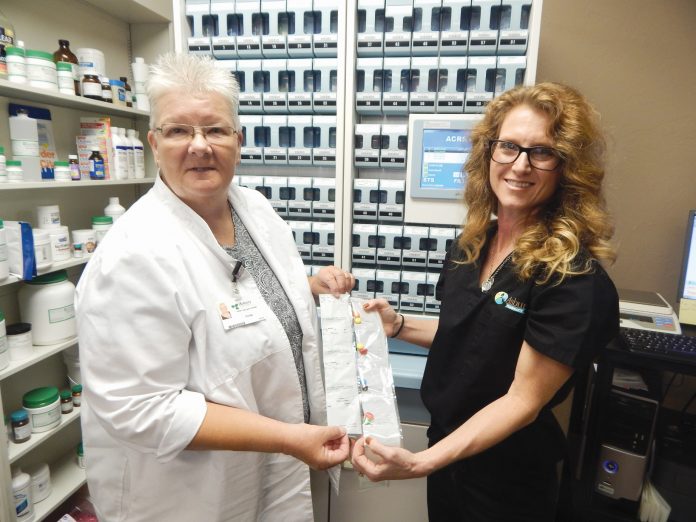
by Bobby Anderson
Staff Writer
More than 125,000 people die every year in the United States due to medication errors, said Cindy Fleming, an LPN with Asbury Durable Medical Equipment in Oklahoma City.
“That is so bad,” she said. “But like today I have a lady coming home from a skilled unit. So you know what I’m up against,” Fleming said. “She’s going to have her meds in a bubble pack, and half of them are going to come from home. So she’s going to be very confused to what’s what.”
So Fleming intends to recommend to the woman’s family that she obtain her medications from a Paratapass machine. This devise can hold 208 medications depending on the type of medication a pharmacist dispenses.
What it does is strip packs those medications by packing morning medications together, as well as packing all the noon and evening medications as needed.
They are properly labeled to have a description of the medication with the expiration date and dosage times. The patient does not have to fill a pill box or try to remember the date and time because it is written down.
“So they will know if they took it or not,” said Laura Cudd, a board certified pharmacist and owner of Asbury Pharmacy.
Patients discharged from a hospital after 30 days with certain medical conditions such as heart attacks, congestive heart failure, pneumonia and other acute cardiac problems will sometimes find that Medicare will not pay the same hospital when they require a second visit.
They end up going to another hospital while the first hospital is docked by Medicare for not preparing the patient properly, Cudd said.
Cudd came to Asbury Pharmacy from the Oklahoma Heart Hospital where she served as the clinical pharmacy manager.
“When I was there, what I did was design programs,” Cudd said. “I did things for meeting Medicare requirements and pain management protocols and diabetes protocols and all this kind of stuff.”
One of the things she focused on was patient re-admissions, investigating if why patients come back has anything to do with their medicines. She found that many patients were having a lot of problems due to not taking their medicine correctly. Cudd realized the next step in her career would be to address that issue. However, she didn’t feel she could accomplish her goal within the walls of the hospital.
“It’s always that transitional period when the patient leaves the hospital that they have problems,” Cudd explained.
There are many things a pharmacist can do to help patients, but they cannot control every aspect relating to patient care, she continued. There remains the issue of whether the patient will have a drug-related error when sent home and begin taking their medicine.
“It’s pretty surprising when people don’t always know how to take their medicines,” Cudd said. “Or they think they know and then the accidentally mess up.”
Knowing this information led Cudd to purchase a Paratapass for her pharmacy. The adherence ratio in the United States averages being nine to 10 days late in filling a prescription, Cudd said. This adds up to two months a year for patients being without their prescriptions. So the Paratapass machine helps patients bridge that gap by providing an extra month and a half of medication coverage that are crucial to health and survival, Cudd said.
When a patient is taking their medication appropriately in a manner that negates confusion then they are not missing days being without it.
“You don’t have them accidentally missing doses because they are dated and timed,” Cudd said. Fleming understands the benefit of the Paratapass because she came to work at Asbury Durable Medical Equipment with a background in home health. She works as a wound care specialist. Fleming also keeps an active administrator’s license.
“When I saw that she was launching this, I was so happy because home health battles this on a daily basis,” Fleming said.
Physicians will see a patient and tell home health nurses to provide a med planner, something Medicare does not provide the patient.
“They don’t consider that a skilled nursing need,” Fleming said. “People 65 and older take five medicines. That includes pharmaceuticals for the prescriptions, vitamins, minerals and supplements.”
The first month of a patient’s discharge from a hospital is crucial. Fleming said Oklahoma has started a new care coordinator’s group that meets quarterly. The group examines hospital rates, taking into account the number of patients hospitalized in the last six months. Where do the patients go?
“13,000 were discharged home. So many thousand were discharged to home health. So many went to hospice and so many went to nursing homes,” Fleming said. “But Medicare has mandated that these are penalty diagnoses they’re not going to pay for. And these hospitals are already struggling that are facing several hundred-thousand-dollar worth of fines.”
They are in rural under-served areas, so it’s a crisis, Cudd said.
The Paratapass helps patients remain safe and avoid returning to the hospital because they are taking their medicines in the correct manner.













